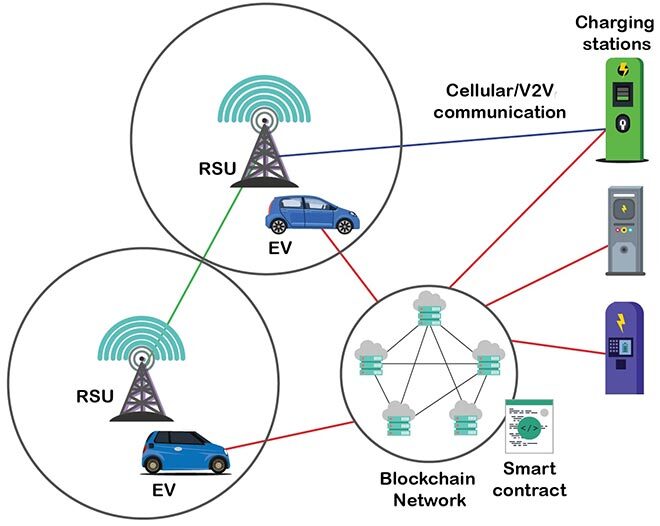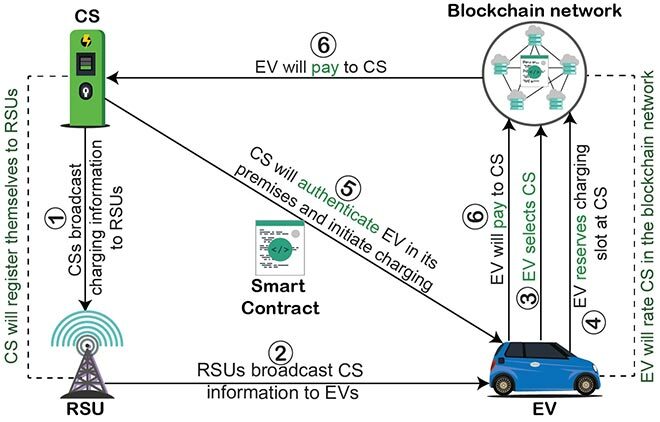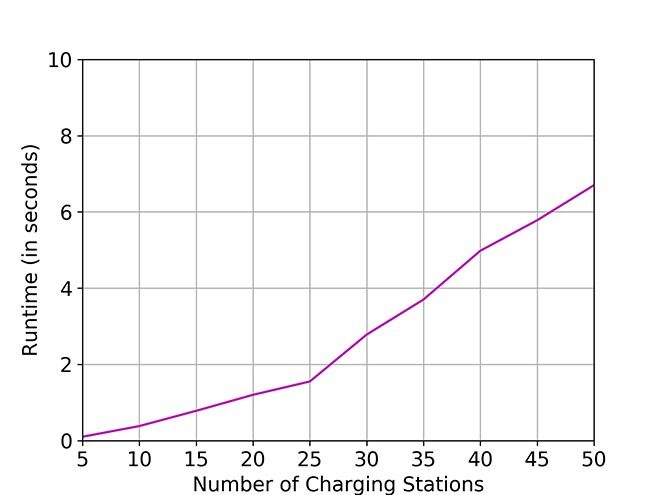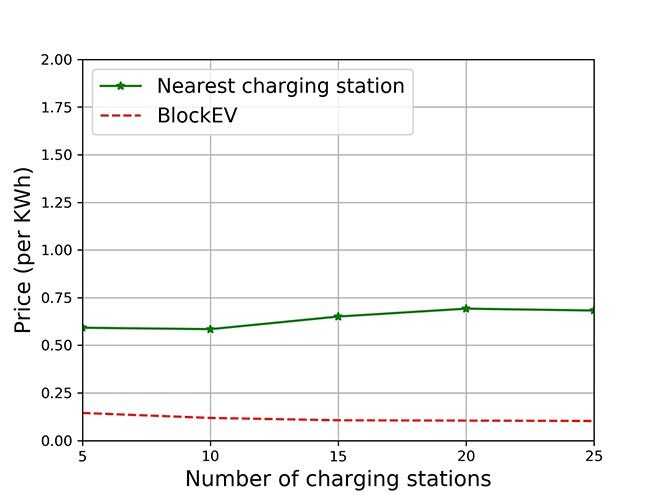Securing Electric Vehicle Charging Networks Using Blockchains

Purchased on Istockphoto.com. Copyright.
The unreliable centralized nature of energy markets and Electric Vehicle (EV) charging infrastructures lead to privacy and security threats to EV users’ private information. These threats include targeted advertisements, privacy leakage, data selling to third parties, etc. This article is a short presentation of BlockEV, a blockchain-based efficient Charging Station (CS) selection protocol for EVs to ensure user security and privacy with high-level Quality of Service (QoS) and enhanced EV user comfort. The design allows EV users to select the best CS locally without having to share private information while fulfilling their service needs. Moreover, the design also enables users to make remote reservations with a CS without the need for a trusted intermediary, ensuring privacy and security.
A Potential Privacy Issue
EVs are an emerging future Intelligent Transportation System (ITS) application in smart cities and have been recognized as a promising solution to reduce CO2 emissions compared to traditional gasoline vehicles. The number of EVs is growing at a significant pace, and this dramatic growth will bring new challenges in managing EV charging. Therefore, to ensure long-term practicality in the EV industry, there is a need to manage EV charging efficiently to provide vital comfort to EV drivers.
The trend is currently moving towards dynamic pricing among competing charging networks in making EV public charging a viable business and each CS service provider possesses distinct characteristics in terms of charging power, total charging time, travelling time, etc., at competitive prices. Therefore, selecting the best CS based on specific EV service requirements will help unlock the flexibility potential for EV users, which is required for successful grid integration of EVs and renewable energy in the future.
Current industry-standard protocols enabling communication between EV and CS in the charging network involve a trusted intermediate mobility operator, which has full control of EV user private information, e.g. identity, location, charging parameters, etc. Collecting such private data and tracking EVs raise serious privacy and security concerns. Thus, users must communicate with the CS directly to reserve a charging slot remotely without sharing their private information, keeping their identities and private information secure.
A decentralized CS selection protocol will help in better understanding EV service requirements and characteristics of CS service providers to make CS selection decisions, which directly affect overall charging network QoS and EV user comfort. Moreover, a blockchain-based reservation mechanism will ensure EV user privacy while interacting with a CS to reserve charging slots remotely at the CS premises, and to make them accountable and auditable for their actions and misbehaviour within charging protocols. This study analyzes the theoretical CS selection problem, secure and trusted reservation mechanisms, proposed practical solutions, and evaluates said solutions.
Blockchain – A Versatile Solution
Blockchain is a type of distributed ledger and is managed by a P2P network without the involvement of a trusted third party. The information stored in the blockchain network is immutable and tamper-proof. Blockchains support smart contracts, a piece of code that automatically executes in a deterministic way when certain conditions are met. Smart contracts are also immutable once they are deployed in the blockchain network. Entities in the EV charging network, i.e. EVs and CSs, are directly connected to the blockchain network and communicate with the help of smart contracts in order to make reservations, authentications, and payments as shown in Figure 1.
The main objective of the blockchain network in our architecture is to enhance trust and enable communication between EVs and CSs without the need for a trusted third party. In addition, blockchain ensures accountability, traceability, and auditability of participating EVs and CSs. Finally, blockchain helps EV users conceal their identity and stay anonymous while communicating with a CS, thus securing their private information.

Figure 1: BlockEV Architecture
BlockEV Design
The proposed blockchain-based EV charging system design is illustrated in Figure 1. Compared to traditional EV charging networks, BlockEV ensures direct communication between EV and CS without the need for trusted third parties. Roadside units (RSU) forward the available CS service parameters to the EVs in their vicinity and this information is used by EV users locally to select the best CS based on their requirements. In addition, the smart contract in the blockchain network is used to store the charging slot reservation information. This reservation information is then used to perform EV authentication and payment at CS premises. The end-to-end EV charging protocol is shown in Figure 2.

Figure 2: EV Charging Protocol
This study addresses two main research challenges, as explained below.
Research Challenge 1 – Selecting a Charging Station
How can an individual EV make an efficient CS selection decision in a decentralized manner without leaking private information to a trusted intermediary, CS, or any other network entity?
Solution – Solving an Optimization Problem Locally
Steps 1 – 3 in Figure 2 explain how the CS is selected without leaking private information. RSUs are deployed across the city to handle control information between CS and EV and are responsible for broadcasting CS charging information periodically to all EVs. Considering this charging information, we theoretically formulate the CS selection problem as a decision optimization problem, with a goal of minimizing the overall cost associated with the CS, while fulfilling the service requirements of EVs (step 3). We define the total cost as a combination of four components: monetary cost, travelling time cost, charging time cost, and waiting time cost. The decision variable defined in the optimization problem is a binary value, i.e. one is the selected CS and zero is Other.
Compared to traditional EV charging networks—where EV users need to share private information with a centralized trusted third party to reserve a charging slot—our proposed protocol allows users to solve the optimization problem locally by retrieving the charging parameters from RSUs, without disclosing their private information to any entity in the network.
Research Challenge 2 – Reservation and Payment Mechanisms
How can an EV make a CS reservation privately without leaking private information to the CS or central entity with guaranteed CS availability, while enforcing interacting entities (EV and CS) to honour reservation and payment mechanisms in an unreliable environment?
Solution – Using a Public Blockchain Address
Steps 4 – 6 in Figure 2 explain the EV charging slot reservation, authentication, and payment through a blockchain network. Once the CS is selected, the EV will call the reservation function of the smart contract with the input charging parameters. Similarly, the CS will also input the charging parameters. If the parameters match, the function will be executed and reservation information will be written on the blockchain network. After reaching the CS premises, the EV will authenticate itself with the help of a smart contract. Finally, after utilizing the charging services at CS premises, the EV will transfer the required amount to the CS by calling the smart contract payment function. The smart contract will also impose penalties if any of the participating parties behave abnormally.
In this blockchain-based protocol, the EV will be communicating with the CS through a public blockchain address, and this public address will ensure user anonymity. At the time of reservation, the CS does not know the EV identity. The EV identity will only be revealed after reaching the CS premises physically.
Evaluating BlockEV
A series of simulations were conducted to analyze the performance of the proposed design. Figure 3 shows the computation runtime to select a CS among a varying number of CSs. The figure demonstrates that the computation time is low when the EV needs to select a CS within a small search range, i.e. a small number of CSs. Conversely, increasing the number of CSs results in more time to generate solutions. Figure 4 investigates the impact of the proposed CS selection mechanism on overall pricing and compares it with the price offered at the nearest CS. The figure shows that BlockEV offers lower pricing compared to the pricing offered at the nearest CS. This is because the solution to the optimization problem will ensure that the CS with the lowest pricing is selected within the solution space.

Figure 3: Computation time

Figure 4: Pricing comparison
Conclusion
Our experimental analysis shows the efficacy of the proposed BlockEV design. The price to charge an EV decreases significantly with our CS selection mechanism, and has the added benefit of an overall increase in QoS. However, most importantly, the proposed design enables EV and CS to communicate with one another without the need for a trusted third party sharing their private information with any other entity in the network, thus ensuring a secure EV charging network.
Additional information
For more information on this research, please refer to the following conference article: Danish, Syed Muhammad, Kaiwen Zhang, Hans-Arno Jacobsen, Nouman Ashraf, and Hassaan Khaliq Qureshi. “BlockEV: Efficient and secure charging station selection for electric vehicles.” IEEE Transactions on Intelligent Transportation Systems (2020).


